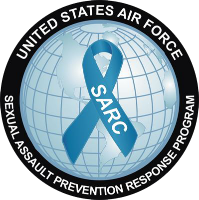
QUICK LINKS
SAPR RESOURCES

Sexual Assault Response Coordinator
Location: Bldg 345, Rm 49 (HAWC)
Office: (631) 723-7338 / Cell: (631) 603-8526
106RQW.HQ.SARC@us.af.mil
106th Victim Advocate: (631) 603-6654
- Crisis Intervention
- Information on medical and counseling services
- Referrals to health and wellness providers
- Ongoing non-clinical support
- Policy/Process Guidance
- Victim support through investigations and court proceedings
- Assistance on the DD Form 2910, Victim Preference Statement, and other Reporting Options for which the victim is eligible
- Help for as along as the victim requires it
NYNG SAPR Crisis 24/7 Hotline: (518) 339-7586
DoD Safe Helpline: (877) 995-5247